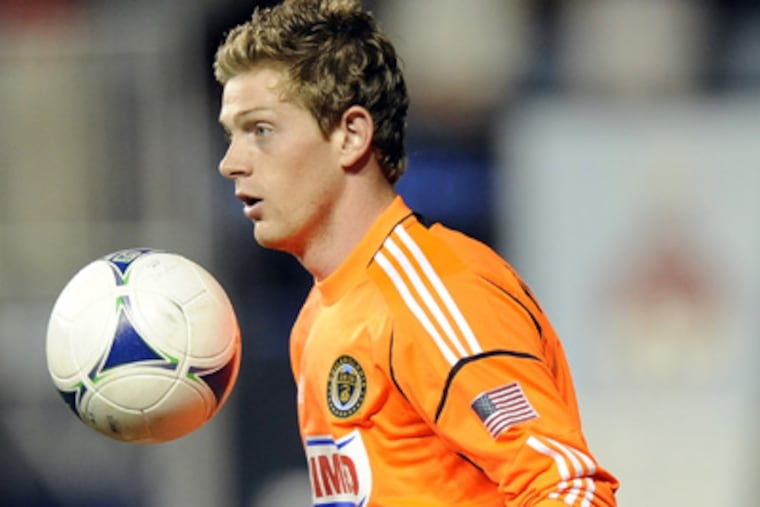Mike Jensen: In pro soccer, college isn't a required course
Many of the best college soccer players in the country don't play college soccer. They are still in college, still of college age, but they also are professionals. Several never played a minute of college soccer.

Many of the best college soccer players in the country don't play college soccer.
They are still in college, still of college age, but they also are professionals. Several never played a minute of college soccer.
A number of Union players are in this category. Full salary-drawing professionals but also college students, taking online courses at schools such as Penn State, Community College of Philadelphia, Delaware County Community College, and UCLA.
"It's very similar to actually being in college," Union goalkeeper Zac MacMath said of taking courses online through Penn State. "It's just, you have to teach yourself. You have a teacher but very little contact. They kind of expect you to go about your business and learn the material, then they grade you on their tests, projects. It's not much different than what I did in college."
MacMath, 21, played soccer at the University of Maryland for three seasons before turning pro. He still has about 30 credits remaining to complete his degree. He isn't saying top soccer players shouldn't go to college. He wouldn't be where he is, MacMath said, if he hadn't gone at all. That was especially true for a goalkeeper, since there are fewer opportunities to get on the field with a pro team.
For field players, there is a greater likelihood that turning pro right out of high school, or during high school, is an option. It's harder to make the case against this if players are working on their degrees while playing professionally, not even waiting until their careers are over.
In many ways, the decision is made for players. If Major League Soccer decides that a prospect is worthy of investment, then players increasingly are likely to make the move. NCAA limits on hours allowed to spend on the sport make it hard to argue that college soccer is the better developmental route.
The argument that having a college degree is worthwhile in itself doesn't change. You just don't have to play college soccer to make it happen.
"I've heard people say the best youth players, they won't enter college," said Union team manager John Hackworth, the former U.S. under-17-year-old national team coach. "There's certain cases that's true, but I don't think that's the case at all times, especially in this country. We value that college education, and there's so much more that goes along with that college education, more just getting that degree and going to class."
Hackworth said the Union have pointed conversations with players interested in turning pro without college, along the lines of, "Hey, we need you to be a good overall person. We need you to be well-rounded in everything. Do you have a plan to do that? Why are you thinking this choice is better for you than going to college? Or coming out early is better?"
Hackworth said the Union are looking into starting a program in which somebody outside the technical staff acts as a mentor to the younger players. This is standard practice in the NBA.
"One thing we have put on our list is [to] make sure our players at least enter an online course," Hackworth said, "so that when they leave here, they still have something they're working toward. That's something we're working on with our homegrown players specifically."
In MLS, "homegrown players" must have lived with their parents in a team's "homegrown territory" for at least a year before college.
Union forward Jack McInerney, 20, said it was an easy decision to turn pro right out of high school.
"The way I looked at it, if I went to college, maybe I'll never get the opportunity again," McInerney said. "I could go to college and get injured or something like that. It was a once-in-a-lifetime thing, and I felt like I had to take advantage of it."
McInerney said he has been taking one or two online classes a semester through Delaware County Community College. Right now, he said, he is taking a financial accounting class.
Amobi Okugo, a California native who played one season at UCLA before being taken by the Union in the 2010 MLS SuperDraft, is taking classes at Community College of Philadelphia. "Hopefully, they'll transfer back to UCLA," the 21-year-old Okugo said. If not, he'll look at transferring to a local school such as Temple or Drexel.
"Sometimes it's tough to get it done. You have to deal with deadlines, and after a tough practice, you might want to rest when you know you have to do some homework on the side," said Okugo, a defensive midfielder who is taking a computer systems and a marketing class.
Another former UCLA player, Chandler Hoffman, played three years in college. That was a no-brainer, the 22-year-old said. He wasn't a pro prospect out of high school in Alabama but scored 18 goals his junior year at UCLA, then was drafted 12th overall by the MLS in the last offseason.
He is part of a "Generation adidas" program, he said, that pays for him to finish his degree. A communications major, he is taking courses through UCLA.
"There are some guys who can't handle coming straight into a professional environment," Hoffman said. "I think college definitely matures you as a player and a person. I think it's case-by-case. Do they need more time to mature?"
That's the real bottom line. For soccer players who have the ability to go pro, it's no longer an educational decision. Union midfielder Zach Pfeffer has been a pro for almost two years, and he's only 17.
"His family has told me," Hackworth said, "he will get a college degree."